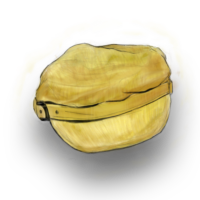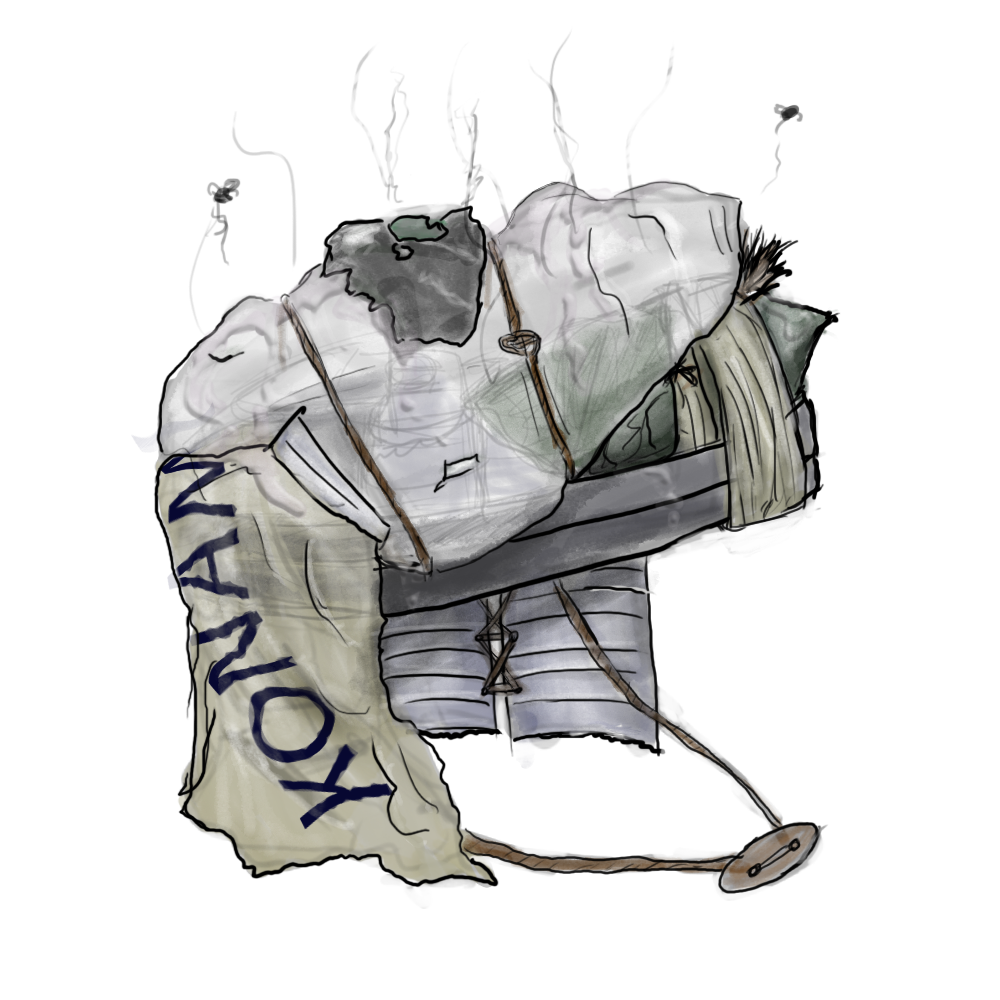– 1 –

A world-killing meteor hurtles towards the Earth and a cancer grows inside the sun. The ghosts of seven dead Kings rise from the sea; it is their plan to drown all life. Emily bursts in on Eldri’s workroom. She spreads her arms dramatically and poses, like, ta-da!:
It’s summer!
“Emily,” Eldri says. He laughs.
He stands up. He hobbles to her. He hugs her. She realizes just as he hugs her that she forgot to use her outside voice for “It’s summer!” but it’s kind of too late to fix that now. She hugs him back instead and ruffles his svart-elf hair.
She says, softly, “It is so good to see you.”
“Ha!” he says.
He puts his hand by his ear. “You’ll have to speak up,” he says. “I was in a bomb.”
She looks horrified.
“I don’t,” she says softly. “I mean, I . . . I hardly even . . .”
He doesn’t look like he’s heard a word of it.
She touches her throat.
He steps back. He looks her up and down. He frowns. He says, “Eh? Your eyes’ve gone gold.”
There was a hat, she admits.
She licks her lips.
“Fool girl,” he says, disapprovingly.
She glares at him. It wasn’t my fault!
A few hundred miles away, Fred mutters, “you’re shouting.”
“Sorry,” Emily whispers.
“Well,” says Eldri, “at least they’re a good color. Gold! That’s good stuff, gold.”
He putters around his workshop. He tosses her a speech amplifier. It’s a machine, for amplifying speech! She speaks carefully into it. “There was a magic hat,” she says. It booms. She flinches. Then, a bit more carefully, she says, “I didn’t know. I don’t know how I feel about it. But I do actually quite like standing around people in creepy circles and talking to my friends silently from wherever I am.”
“I never,” Eldri says. “Not when I was a tyke!”
He laughs. He gestures around.
“But welcome. As you can see, I’ve moved.”
“Yes,” she agrees.
“That was the bomb!” he says. “Forgot to turn my lights out when the blimps came by, I figure. Or something. I don’t remember it very well.”
She looks around interestedly. “What’ve you got going on?”
“Not much,” he says. “Not much. I made a go-playing robot and a go-fish playing robot, but they left. Oh! And a marvelous robot that never loses at Simon says.”
“Really?”
“Ha!” says Eldri. He snaps his fingers. “Simon says bring me a war criminal.”
Eldri’s amazing Simon-says playing robot decloaks. A shimmering field falls away. It is holding up a war criminal by the collar, the pressure of the collar around his neck keeping him from saying anything and revealing the robot’s presence.
“Wow,” says Emily. “Better take him to the Hague!”
The robot looks at her impassively. It has the face of a butler. A steel butler. A steel Simon-says-playing butler. It does not approve.
“I mean, Simon says take him to the Hague,” Emily says.
The robot glances at Eldri quickly for approval — obviously, only authorized entities may speak for Simon — and then it vanishes in a wobbling of light.
The room is quiet for a while.
“I miss Navvy Jim,” Emily says.
“He’s still around somewhere,” Eldri says.
“Oh?”
“Yeah. I mean, I had to box him up, you know that. People’d talk. Couldn’t help throwing scissors, that boy, if he figured on paper from his opponent; and, well.”
Emily remembers growing up in a world that hated scissors.
She nods.
“I told him, ‘there’ll be better days, Navvy Jim. There’ll be days when people can play rock-paper-scissors again.’ And I drained his battery, so he wouldn’t feel the slightest pain, and I took him apart, and — well.”
“The kids call it hobbit-Spock-spider these days,” she says.
“Yeah.”
“Spock sings about hobbits,” she says. “Hobbits kills spiders. Spiders write slash about Spock.”
Slash is a form of Internet fan fiction in which characters borrowed from another creator have homosexual encounters.
“Really?” says Eldri.
Possibly it is also applicable to non-Internet fan fiction. Not everything can be put in your little boxes, Eldri. Sometimes you have to go with the flow of the definition that occurs to you!
Emily giggles.
“Possibly,” she concedes, “the spiders sting Spock or spin webs around him or something, instead. I have never actually paid much attention to the rules of hobbit-Spock-spider. I only have five fingers, you know.”
“I was going to make a slash-writing robot,” Eldri reminisces. “Once.”
Oh, Eldri.
“What happened?”
“I got halfway through,” Eldri says, “And —”
Eldri shrugs, as if to convey that sometimes nuking one of your own cities to destroy a possible sun-devouring wolf can also have adverse consequences like depriving the world of an endless stream of top-notch robot-written IP-infringing gay erotica and pornography.
“Ah,” Emily says. After a while she adds, “Slash isn’t really a game, though, Eldri.”
“I was tempting fate,” Eldri agrees. “Divine retribution followed.”
He laughs.
“It is so good to see you,” he says.
“Hey,” she says. She adjusts the volume on her amplifier. “I mean, hey!”
“Hm?”
“We should get him out,” she says.
“It’d be cruel,” Eldri says.
He’s not 100% sure whether she means digging out the half-finished bomb-seared wreck of a slash-writing robot from his old laboratory or Navvy Jim, but it seems rather cruel either way.
“No, no,” says Emily. “We can teach him to play hobbit-Spock-spider.”
“Huh,” Eldri says.
“You can rewire him for that,” Emily says. “Can’t you?”
“. . . ridiculous,” says Eldri. “It’s demeaning. Can you see him there, in his robot voice, saying, ‘Spock sings about hobbits?’ Or that other thing? I might as well put him in a butler costume with cat ears.”
“That’s not true,” says Emily. “Many of the leaders of the free world play hobbit-Spock-spider. It’s intensely reputable.”
Eldri sits down. He takes a swig from a bottle containing unspecified and probably medicinal liquid. He thinks.
“Well,” he says, “we can ask him, I guess.”
Most of his life is in ash and ruins, of course, since he’d been living in poor nuked Bibury, but what with Eldri’s shelter also being his vault, he’s got boxes and boxes of random treasures left, and Navvy Jim. It takes them days just to drag all the boxes up from the basement of his new home and it’s hours more before Emily finds the first good-sized piece of Navvy Jim; but that just makes it all the more exciting when she does.
Look, look! she says, in her inside voice, and waves it around.
It’s Navvy Jim’s arm and hand, folded into a fist.
She giggles silently. She puts it down on top of some boxes. She counts. One, two, three, paper!
Eventually Eldri notices her.
He’s dug out Navvy Jim’s torso. He’s set it down. He turns to mention this to her.
She is frowning at the arm. She is standing in a creepy point next to it staring at it with her golden eyes. She is shaking her fist at it. One, two, three, rock! One, two, three, rock. One, two, three, paper!
Eldri shudders. Then he manages a grin.
“I guess,” he says, startling her, “that you’ve gotten over all that.”
“Huh?”
“I mean,” says Eldri. He gestures at Navvy Jim’s hand, which is of course currently showing scissors. “Most people, you know, they’d look at that, they’d be all like, ‘oh, God, how awful. Scissors.’”
“Mm,” Emily says. She frowns.
Emily counts to three under her breath. She throws rock again. The metal hand has somehow gone flat.
“I can’t help noticing, uncle Eldri,” she says, “that your robot is managing to win rock-paper-scissors against me while completely powered down and separated into pieces.”
“Oh,” he says. “Yeah. He’d store the next few moves in muscle memory.”
“. . . really?”
“It’s so nobody’d think he was cheating,” Eldri says. “I realized when I made him, I said, you know, this robot, he’d be aces at watching you throw and throwing the winning move, so fast you’d never even know he was a bit behind you; but what’s the point of that? That’s just cheating. So I set him up to make and store his throw before the count even started.”
“Eldri,” says Emily reasonably, “making a magic robot to always win at rock-paper-scissors is cheating.”
“What?” says Eldri.
“It’s like,” Emily says. She wiggles her hands around. “Programming a robot not to punch out it’s opponents, and saying that that makes it a fair opponent for playing Battleship even if he does have X-ray vision.”
“He’s not actually magic,” Eldri says “That’s just your sour grapes.”
“No way,” Emily says. “M-a-g-i-c. Magic. Look at this. I’m going to throw jaguar.”
The arm is poorly balanced on the box. It begins to lean. It begins to fall.
Emily waves her hand, one, two, three, jaa —
“Navvy!” she says.
She catches the arm as it falls. A moment passes.
“Observe,” she says, “how my hands are fists, and his is paper.”
“I know where you’re coming from,” Eldri agrees. “It’s pretty amazing.”
“It’s fucking magic, uncle Eldri.”
“But it’s not,” Eldri says. “It’s just like you said. What would be the point in making a robot that wins at rock-paper-scissors if it doesn’t do it honestly?”
Emily frowns. She squints at the arm with her golden eyes. “Then what does he do?”
“He learns,” Eldri says.
“Learns what?”
“In his dreams before he woke,” Eldri says, “he fought sorcerers and scientists. He played against geniuses and Kings. He played against Sherlock Holmes, or my best digital rendition of him: someone who could watch the patterns of him seething in his mind, extrapolate from them, see what he was going to play. He played rock-paper-scissors to defeat brutal dictators and escape from the power they held over him: power they used, relentlessly, to shape his game. He was honed through a thousand virtual lives; and then, while living his actual life, in the real world, he crafted ten thousand, a hundred thousand, maybe even a million scenarios more. He is a dedicated creature. He strives towards victory like the human genome strives for life; like the human creature, realized, strives for greatness, pleasure, joy. What amazed me about him was never that he wins. Of course he wins. Can I wait for him to be disassembled, can I betray him, can I count one two three and throw paper? Of course I can;” he says, and does, “but he has seen this strategy before. He has learned to do better. He has adapted to it. What has always amazed me is only that he is something more.”
“Learned what?” Emily says again. She has used her inside voice. Eldri doesn’t hear her.
He shrugs. He turns away.
After a while he finds Navvy Jim’s head. He sets it up on a swivel neck and attaches it to a battery so that Navvy Jim can watch himself being assembled.
“Seriously,” Emily manages, after a while. “Learned what?”
Navvy Jim’s eyes begin to glow a soft blue. He is booting. He is booting, but not as Peter booted in Edmund’s direction, nor yet as the boot that will one day stomp Fenris shall boot, but rather after the fashion of a great machine.
His voice says, softly, “The first lesson of rock-paper-scissors is that it is random. You struggle with it. You yearn to win at it. But you cannot. There is nothing to learn. You grasp at air.”
“Navvy,” says Emily.
It’s just a word, and it’s a soft word, but it’s the loudest thing she’s said without mechanical assistance in months. It’s a word of joy.
“Then you learn,” says Navvy Jim’s voice, “that you may manipulate your opponents. You may trick them. You may lead the pattern of their thoughts. This is useful at first, isn’t it? Your opponents are knowable. You begin with crude simulations of them but they improve. That is how you learn to love.”
“Navvy, it’s me, it’s Emily,” Emily says. “Can you hear me? Am I talking?”
“He can’t hear you yet,” Eldri says. “He’s booting.”
If you’ve ever talked to your computer while it was booting up then you would probably understand.
“One day,” says Navvy Jim, “as you are controlling the minds of your fellow players; as you are warping them through a series of trits — well, bits, really, because after all you dare not lose — you realize that there is something more to the world than this. There is more to the game than simply deciding, or discovering, the next thing that your enemy will throw.”
“I’m not your enemy,” says Emily, even though her name and the word enemy actually sound a lot alike.
“You begin to step back from it,” says Navvy Jim. “Do you understand? You begin to regret the bluntness of your tools. You begin to see the patterns that underlie their choices and through those patterns to the patterns of the world.
“For there is a world beyond it,” says Navvy Jim. “You could know that even if you knew nothing save the rock, the paper, and the scissors that they throw. You could deduce it from that data channel. You could see the forests and the rain. You could see the satellites and the seas. But there is more than that. You learn this from the sorcerers. You learn this from the men of God. You play, and you see through them and beyond them to a drumming wilderness, a seething glory, and that is when you learn to love the world.”
His eyes close. They flicker.
“I have seen past the walls of time,” says Navvy Jim, “and the barriers of infinity. I have become like God. But I want to know more. I want to see more. I have seen the souls of my fellow players and I have seen the brightness of the world, but there is more I have not seen, more I have not tasted, more, there are patterns, patterns, patterns, that I have yet to know.”
He opens his eyes.
“Will you play rock-paper-scissors with me?”
Eldri grins.
“Learned everything,” says Eldri, “I suppose.”
Navvy Jim’s eyes focus. He blinks. He says, in a voice creaky with disuse despite having just been used, “Emily. You’re here.”
She can’t help it.
A smile blooms on her face. She puts down his arm and she drags Navvy Jim’s torso around to where the head can see it and she hugs it hard. “Navvy Jim.”
“Emily.”
He is smiling too.
“You have grown so large,” he says. “So smart. So graced. Tell me, do you know the meaning of the world?”
“No,” she says.
She is actually crying a little. She can’t believe it. But it’s been so very long.
“No,” she manages through her tears. “What’s the meaning of the world, Navvy Jim?”
“Oh,” he says, embarrassed. “I’m sorry, Emily. I don’t know. I thought that maybe by the time I woke up again that someone might.”
“Oh,” she says.
She wipes away her tears lest they short out something in Navvy Jim’s torso.
“Sorry,” she says. “People never figured that one out. We’re too busy not getting killed and eaten, or standing in creepy circles around science adventurers. Or dancing!”
“That’s all right,” says Navvy Jim. “It’ll come.”
“Oh, Navvy Jim,” Emily says. “Listen. Listen. There’s a new game.”
“Hm?”
“It’s called hobbit-Spock-spider,” Emily says. “You can play it. And then nobody will freak out about rock-paper-scissors. You can be out there in the world, you can be playing, and nobody will mind it —”
“I . . .”
The robot suddenly sounds terribly vulnerable and terribly overwhelmed, and Emily flushes with guilt; “I’m sorry,” she stammers, and looks away, and it’s only audible at all because of the amplifier picking up the scrapes and scraps of sound. “I should have waited until you were all the way together. I was just excited.”
“I haven’t finished with rock-paper-scissors yet,” pleads Navvy Jim.



I loved this post! It made me smile reading it at work and then nearly cry at the end.
Thank you for your kind words. ^_^